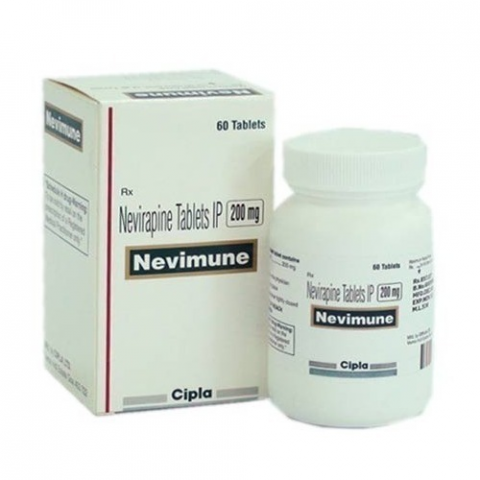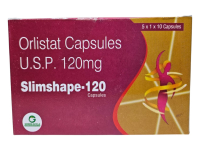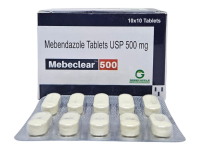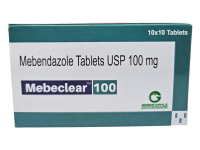Nevimune 200mg (Nevirapine)
Nevimune tablet USP is indicated in combination with other antiretroviral agents for the treatment of human immunodeficiency virus (HIV-1) infection in adults and pediatric patients 15 days and older
INDICATION
Nevimune tablet USP is indicated in combination with other antiretroviral agents for the treatment of human immunodeficiency virus (HIV-1) infection in adults and pediatric patients 15 days and older
MECHANISM OF ACTION
Nevimune is belongs to a non-nucleoside reverse transcriptase inhibitor (NNRTI) of HIV-1. Nevimunelinks directly to reverse transcriptase (RT) and stops the RNA- dependent and DNA-dependent DNA polymerase activities by making a division of the enzyme's catalytic site. The action of Nevimunehave not finished with template or nucleoside triphosphates. HIV-2 RT and eukaryotic DNA polymerases such as human DNA polymerases α, ß, γ, or δ are not prohibit by nevirapine.
ADME PROPERTIES
ABSORPTION
Bioavailabilty of Nevimune in human is 93±9% for 50mg tablet and 91 ± 8% for oral solution and in rate is 89.7%. peak plasma concentration is 2 ± 0.4 mcg/ml attained by 4 hours.
DISTRIBUTION
Plasma protein binding is 60%
METABOLISM
Nevimune extensively biotransformed via cytochrome P450 and metabolished to several hydroxylated metabolites
EXCRETION
Excreted via urine 81.8 ± 11.1% and feces in 10.1 ± 1.5% Total radioactive in urine is 80% was made up of gluvuronide conjugation. Half life is 45 hours
DOSAGE MANAGEMENT
The dose recommended for adult The recommended dose for Nevimune is one 200 mg tablet daily for the first 14 days, followed by one 200 mg tablet twice daily, in combination with other antiretroviral agents. The 14-day lead-in period with Nevimune200 mg daily dosing must be strictly followed as the lead-in period has been observed to decrease the incidence of rash. If rash continueapart from the 14-day lead-in period, do not dose expand to 200 mg twice daily. The 200 mg once-daily dosing medication should not be continued above 28 days, at which point, an alternative drugs should be desired. For combination administered antiretroviral therapy, Theusual dosage and monitoring should be followed.
For pediatrics
The usual oral dose for pediatric patients 15 days and older : 150 mg/m 2 given once daily for period of 14 days followed by 150 mg/m 2 administered twice daily thereafter. The entiredose for daily should not exceed 400 mg for any patient.
PRECAUTION
Hepatotoxicity and hepatic impairment
Serious life-threatening in patient, and in some cases fatal hepatotoxicity, involving fulminant and cholestatic hepatitis, hepatic necrosis and hepatic failure, have been reported in patients treated with Nevimune .
Skin reaction
Serious and life-threatening skin reactions, involves fatal cases, have been reported in patients taking Nevimune .
Drug interactions
Concomitant use of Nevimunewith efavirenz is not recommended as this combination has been associated with an increase in adverse reactions and no improvement in efficacy. Resistance
Immune reconstituents
Immune reconstitution syndrome has been resulted in patients reacted with combination antiretroviral therapy, including Nevimune . During the initial phase of combination antiretroviral treatment, patients whose immune system behave may grow an inflammatory response to indolent or residual opportunistic infections (such as Mycobacterium avium infection, tuberculosis, cytomegalovirus or Pneumocystis jiroveci pneumonia), which may necessitate further evaluation and treatment.
Fat redistribution
Redistribution/aggregation of body fat involves central obesity,buffalo hump (dorsocervical fat enlargement), peripheral wasting, facial wasting, breast enlargement, and “cushingoid appearance” have been observed in patients receiving antiretroviral therapy
DRUG INTERACTION
Drugs extensively metabolised by CYP3A or CYP2B6 while interacting with. Efavirenz, atazanavir/ritonavir, fosamprenavir w/o ritonavir. Ketoconazole, fluconazole, itraconazole, warfarin, rifampicin, methadone, Nevimune interaction with Oral contraceptives, clarithromycin, St. John's wort. Adefovir, boceprevir, entecavir, interferons (pegylated interferons alfa 2a & alfa 2b), ribavirin, telaprevir, telbivudine; elvitegravir/cobicistat; delavirdine, etravirine, rilpivirine; emtricitabine, abacavir.
CONTRAINDICATIONS
Patients are contraindicated with moderate or severe (Child-Pugh Class B or C, respectively) hepatic impairment Forindicatedas part of occupational and non-occupational post-exposure prophylaxis (PEP) drugs.
PREGNANCY
In animal reproduction has no evidence of adverse reaction but there is a serious risk in pregnant women exposed to nevirapine.There is a pregnancy exposure registry that monitors pregnancy outcomes in women exposed to Nevimune during pregnancy.
LACTATION
There is no information on the effects of Nevimuneon milk production. Because of the possible for HIV-1 transmission (in HIV-negative infants), Introduction viral resistance (in HIV-positive infants), and severe adverse reactions in nursing infants, mothers should not breastfeed if they are gettingNevimune.
STORAGE
Store at 25°C (77°F); Keep the drug reach out of children
MISSED DOSE
In case of missed dose, patient must be consult with physician and follow the instructions.Maintain the regular dosing schedule. Missed dose of drug should be avoided.
Пока нет комментариев


























